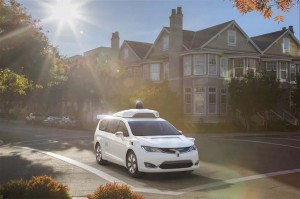
Fiat Chrysler CEO Mike Manley hasn't stopped looking for partners the wake of the FCA-Renault falling apart.
Fiat Chrysler will form an alliance with autonomous vehicle start-up Aurora to develop technology for commercial vehicles that could range from hands-free taxis to driverless delivery trucks.
Aurora currently runs operations in Pittsburgh, Pennsylvania as well as San Francisco and Palo Alto, California, three of the hotbeds of autonomous vehicle research, with more than 200 employees. Earlier this year it raised $530 million through a Series B funding round, with Amazon one of its key investors.
“As part of FCA’s autonomous vehicle strategy, we will continue to work with strategic partners to address the needs of customers in a rapidly changing industry,” said Mike Manley, chief executive officer, Fiat Chrysler Automobiles. “Aurora brings a unique skillset combined with advanced and purposeful technology that complements and enhances our approach to self-driving.”
The deal, which officially links Aurora with Fiat Chrysler’s North American unit, FCA US, was announced only days after the parent company broke off merger talks with Renault. One of the potential benefits of that tie-up would have been access to autonomous and electrified vehicle technologies being developed by the French automaker’s Japanese alliance partner, Nissan.
(French government blamed for collapse of Fiat Chrysler-Renault merger plan. Click Here for the story.)
FCA insiders have blamed French government interference for scuttling the proposed “merger-of-equals,” but sources in France have, in turn, claimed that they were concerned that the deal could have fractured the two decade old Renault-Nissan-Mitsubishi Alliance.
What is clear is that Fiat Chrysler has needed help when it comes to autonomous technology. Under Sergio Marchionne, the former CEO who passed away unexpectedly last summer, it was little more than an afterthought. There was little work done in-house, in sharp contrast to other major competitors such as Nissan, Toyota, Volkswagen, General Motors and Ford.
Prior to this announcement, FCA’s biggest move in the autonomous field was to agree to provide as many as 60,000 Chrysler Pacifica Hybrid minivans for use in the new Waymo One ride-sharing service started by the Google spinoff Waymo in the Phoenix area – which is scheduled to expand to at least 20 more cities in the coming years.
In an ironic twist, Aurora’s CEO Chris Urmson, a pioneer in the autonomous field, previously headed Waymo before it was spun off by Google and new CEO John Krafcik came onboard.
In the non-monogamous world of high-tech transportation, the connecting lines crisscross all over one another. Amazon, which is now paired with FCA though Aurora, led a consortium that purchased a major stake in electric vehicle start-up Rivian earlier this year. While the digital retailer hasn’t explained its goals, it is widely believed to be working up plans to field a fleet of driverless delivery trucks.
Meanwhile, another investor in Rivian is Ford Motor Co., a key rival of Fiat Chrysler’s in the commercial vehicle market.
(Click Here for more about the failed FCA-Renault merger.)
Neither FCA nor Aurora would discuss specific details of their new alliance, including any financial arrangements. Earlier this year, after the Series B funding round was completed, the start-up reportedly had a $2.5 billion valuation, according to the Reuters news service.
Along with the new FCA deal, Aurora has also forged relationships with Hyundai, Volkswagen and Chinese electric vehicle start-up Byton.
“We are thrilled to forge a partnership with FCA US to develop a meaningful business model for delivering the benefits of self-driving commercial vehicles,” said Sterling Anderson, Aurora co-founder and chief product officer.
Precisely what those vehicles will be isn’t clear, but the dozens of automakers and research firms exploring autonomous technology see a number of possible options. The general consensus is that costs will run too high, at least in the early years, for most consumers, putting the focus on commercial ventures. These include autonomous cabs like those Waymo One is fielding, with General Motors and its Cruise Automation subsidiary promising to launch their own operation later this year.
Local delivery services would like to dispense with costly drivers, as well, though the challenge is resolving the “last 100 foot” problem, getting packages from the truck to the door. Some experiments have required customers to go and pick up their packages but that isn’t seen as a popular option. Drones are a possibility, but Ford last month demonstrated a robot that could take packages from truck to drop-off.
(Waymo kicks off autonomous taxi and ride-sharing service. Click Here for the story.)
Long-haul trucks are also a possibility, though not an area in which FCA competes. Its former partner, Daimler AG, however, has been fleet testing hands-free technology through several subsidiaries, including the U.S.-based Freightliner.

